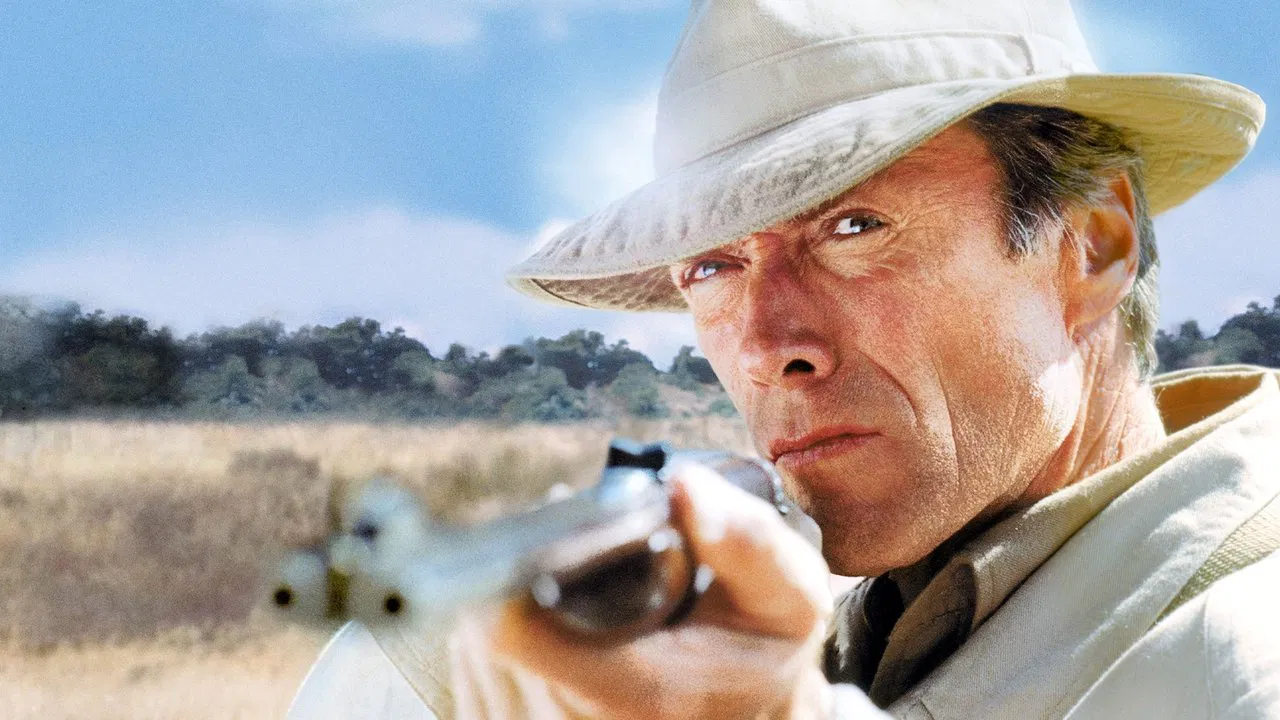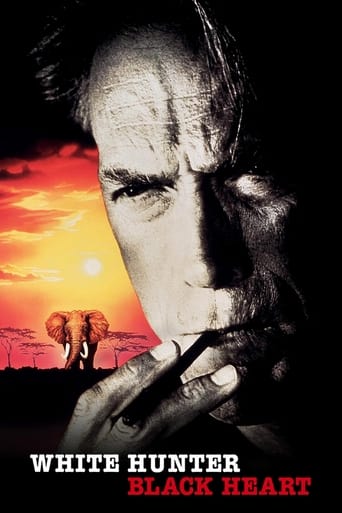

I like the storyline of this show,it attract me so much
... View MoreExcellent, a Must See
... View MoreAll of these films share one commonality, that being a kind of emotional center that humanizes a cast of monsters.
... View MoreBy the time the dramatic fireworks start popping off, each one feels earned.
... View MoreThe egocentric, stubborn and grumpy Hollywood director John Wilson (Clint Eastwood) invites his friend Pete Verrill (Jeff Fahey) to write the screenplay of his next movie that will be a masterpiece in his opinion. He convinces the producer Paul Landers (George Dzundza) that the movie must be shot in Africa and they travel to the continent. Once in Africa, John becomes obsessed to hunt an specific elephant and neglects his cast and crew prioritizing the hunting with the native Kivu (Boy Mathias Chuma). "White Hunter Black Heart" is an underrated fictional movie directed by Clint Eastwood. The character John Wilson is based on the director John Huston. Clint Eastwood has an amazing work performing a character with strong personality and stubbornness. My vote is eight.Title (Brazil): "Coração de Caçador" ("Hunter Heart")
... View MoreClint Eastwood tries acting out of his normal character in this movie, being as verbose as possible. Not knowing how director John Huston looked or sounded like, I cannot say how well Eastwood portrayed him, but Eastwood simply looked like Eastwood doing a lot of talking for a change.The plot has Huston in Britain, talking some backers into having a movie set in Africa actually located in Africa, rather than on unconvincing studio backdrops as had been done in the past. Then Huston is in Africa, having a run-in with a hotel manager and several other people, and worse yet, showing little interest in actually making the movie, but strongly desiring to shoot an elephant instead. As the title implies, the attempt to shoot the elephant winds up going badly.So what went wrong? Basically, the story moves slowly, and we don't really understand Huston or his motives. Why fight to have a movie set in an exotic location, and then show little interest in making this movie once there? There seems to be no real point to the story, and we feel dissatisfied in the end.
... View MoreIn Clint Eastwood's thinly veiled portrait of director John Huston's making of The African Queen, he plays John Wilson, who has traveled to Africa to make a movie. He instead becomes obsessed with tracking down and killing an elephant. A writer accompanying him, Pete Verrill(Jeff Fahey), is adamantly opposed to the idea of shooting such a magnificent animals. They argue over the morality of hunting for the sport of it.Eastwood shows the philosophical aspects of his characters quest. The white hunter with the black heart is within all of us. Everything we strive for has a price to pay, sometimes big and sometimes small, but always there. As the saying goes, be careful what you wish for. I believe that Black Hunter White Heart may well be Clint Eastwood's most underrated film.
... View MoreJust prior to the success reaped by UNFORGIVEN, Eastwood unleashed this labor of love that scuttled beneath the radar and has since gone inexplicably underrated, even among die-hard Clint enthusiasts. Working with journeyman writer Pete Viertel (adapting the screenplay from his famed novel) and veteran western scribe Burt Kennedy, Clint (fulfilling the triple-threat of producer-director-actor) spins a controversial portrait of enigmatic Hollywood legend John Huston. Clint essays Huston in what is a semi-autobiographical look at the behind-the-scenes of the filming of the Bogie/Hepburn classic THE African QUEEN. John Huston was easily one of Hollywood's most complicated and larger-than-life figures, the "Hemingway of cinema". A highly-literate man who took great interest in art, he was also a hot-tempered brawler, inveterate boozer, and notorious womanizer. A master craftsman, Huston lacked any distinctive "style" as he eschewed tricks and gimmicks in favor of good old-fashioned story-telling. Behind the camera, Huston was responsible for an almost unequaled legacy of masterpieces, many of which defined their respective genres. He wasn't afraid to step in front of it either, giving us one of the greatest villains in movie history, Noah Cross, in the landmark CHINATOWN. Politically, he was an outspoken humanitarian and staunch advocate of civil rights. The story concerns Huston's (oddly called "Wilson" here) contentious working relationship with Viertel (Jeff Fahey, Ray Liotta's undiagnosed twin), whom he brings onboard to do a script rewrite, and his pursuit of the mystical white elephant. The hunt for his elusive query becomes a perilous spiritual quest, and his determination to kill the beast gives way to obsession that threatens to jeopardize the production of the movie and strains his friendship with Viertel. Eastwood, excluding his wiry lankiness, bears no physical resemblance to John Huston. However, he clearly has a blast playing the role to the hilt, as he struts with a cigar and adopts Huston's unique vocal cadences. He gives a well-rounded portrayal, striking a balance between the myth and the less-than-flattering picture of the man painted by those who knew him intimately. Those involved go for a "warts and all" presentation; Eastwood is egotistical and overbearing, caustically belittling those around him and ignoring his cast and crew as he stubbornly protracts his hunt. However, such moments are juxtaposed with scenes demonstrating Huston's sense of honor; he venomously intercedes when a woman insults Viertel's Jewish ancestry, and (in of my all-time favorite movie scenes) challenges a racist hotel manager to a fistfight after he physically assaults a black waiter on his staff. Overall, it's a vast departure for Clint, and he helps us understand why John Huston was a radical figure equally feared and admired. Having not read Viertel's book, I don't know what's true and what's fictional. I know that Huston's bosom buddy was Bogie, who is relegated entirely to the background here while Viertel's role is greatly emphasized. Were Viertel and Huston that chummy? Did their personal and creative differences form that much of the production process? Why did Viertel ultimately go un-credited, and how great were his contributions to THE African QUEEN? Despite such questions, I love WHITE HUNTER BLACK HEART for what it is, which is an enormously entertaining and intriguing behind-the-scenes look at classic Hollywood. It's also a no-holds-barred portrait of one of its most respected scions, courtesy of a gritty and courageous performance by Clint. As a plus, the exotic locales provide a jaw-dropping spectacle, with the African fauna and wildlife thrilling to behold. I attribute the ambivalent reaction to a failure by most to grasp the significance of the elephant, and what it means to Eastwood's character. The movie also ends on a note of ambiguity. Truthfully, I'm unable to provide any satisfying explanation. I interpret it all esoterically, as a seemingly-invincible character is undone by his human frailties, i.e. greed, vanity, and delusions of grandeur. Whatever you glean from it, WHITE HUNTER BLACK HEART is an immensely rewarding experience, and a high point in Eastwood's career as a filmmaker.
... View More